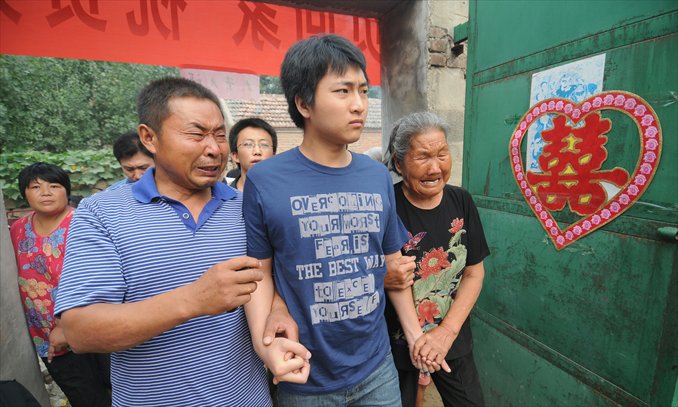Lost and found


It took nearly two decades for Xie Biao to go back home. In January 2013, the 24-year-old Xie Biao registered on Baobeihuijia (Baby Come Home), a website for reuniting lost children with their families, 20 years after losing his parents and being adopted by another family.
Xie vaguely remembered straying from his biological parents near a food and vegetable market in Guangzhou, Guangdong Province when he was four years old. He also remembered his hometown was by a river and his parents, who were farmers, traveled a long way to work in Guangzhou.
Using this key information, volunteers on the website eventually found a vendor who used to work in the market and by making inquiries, Xie was finally reunited with his family in late August.
Xie is one of the many missing children returned to their families with the help of Zhang Baoyan, founder of Baby Come Home, a non-governmental group that helps search for missing children and offers support to their parents all across China. Since 2007, Zhang and her husband Qin Yanyou have provided a platform for missing children to share information and help search for their family.
Pain of loss
Zhang has developed a network of more than 20,000 volunteers nationwide, and through them has helped more than 600 families reunite.
"I totally understand the desperation and torture of those parents who lost their children, and I feel obliged to help them," 51-year-old Zhang, born in Tonghua, Jilin Province, told the Global Times.
One day in 1992, Zhang's mother turned up at her daughter's office distressed, after losing Zhang's four-year-old son in a supermarket. Zhang and her family desperately searched for her son in the city, eventually finding him at his grandpa's home late that night.
"During the several hours I thought I would lose my son for good. I told myself if I lost my son, I would rather die," Zhang said.
After that, Zhang began to pay huge attention to the social problem of missing children. She began collecting information about missing children from media reports.
She even participated in a rally for parents with lost children, and distributed flyers. But in time, she realized that individual efforts were not enough.
Human trafficking has become a serious problem in China. Due to a traditional preference for male heirs, particularly in rural areas, a rampant black market for babies has developed. Some families who are infertile will pay tens of thousands of yuan to buy a baby.
"While each parent searched for their own missing child, a lot of information was wasted," Zhang said.
"Even though they might not find their own child in the end, the information and clues they have collected during the process might be useful for other families," Zhang said, explaining why she launched the website in 2007.
The website came at a price. Zhang, who used to work as a clerk in a local bank, quit from her job. Her husband Qin, a computer teacher at a local college, and his students spent more than half a year building the website. It cost them tens of thousands of yuan.
To draw in people, Zhang and her husband spent hours surfing the Internet everyday, looking for parents who posted notices of missing children on popular online forums and called them, offering help for free.
"But a lot of people hung up or accused us of being swindlers. They said they had been cheated many times and had come to think no one would ever help others for free," Qin said.
Their website also used to be intermittently shut down by the local police, more concerned about face than results. "Releasing massive amounts of information about the missing children was regarded as pointing finger at the public security bureaus, criticizing them for neglect of duty in finding the missing children," Zhang said.
Network of volunteers
On the website, parents who are searching for their children and children looking for their origins can post photos, personal information and all detailed information in two different columns, "families searching for babies" and "missing babies looking for families."
After people register on the website, a volunteer would follow up the case and ask set questions to help collect information.
"We ask missing children specific question, such as the location of their home, what plants and animals they remember, what kind of dialect they spoke when young. By analyzing the detailed information provided by the missing children, we can match these clues with parents who post information on the website," Zhang said.
"Sometimes, we have to send volunteers to carry out visits in the hometown of missing children to make inquiries about the whereabouts of their parents," Zhang said. "More than half of the missing children registered on our website were abducted."
Out of the 12,000 children who have registered on the site, only 5 percent have found their parents.
Govt cooperation
Zhang's work has attracted attention from the government. In 2009, the Ministry of Public Security (MPS) sought cooperation with the website, asking the website to report the information and clues of missing children and the human-traffickers.
So far, the website has provided more than 1,000 messages involving both missing children and parents' calls for help to the ministry since 2009.
"Zhang's website has provided some valuable information that helps anti-trafficking work," Chen Shiqu, director of the anti-human-trafficking office in the criminal investigation department under the Ministry of Public Security, told the Global Times.
Zhang is also a member of the think-tank for the anti-trafficking officers. Due to the public call for it and Zhang's suggestions, the MPS has also set up a nationwide DNA database, ordering its branches to collect DNA of the parents of abducted children and children who are suspected of having been abducted or lost.
But in a lot of places, particularly in the rural areas, parents have little knowledge of DNA and are fearful of handing over information to authorities.
"We hope the media can publicize the scheme, telling parents DNA collection is free and encouraging them to do it," Zhang said.